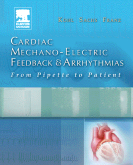|
|
|
| |
 |
|
|

|
 推薦指數:
推薦指數:





|
|
- 內容介紹
|
Cardiac Mechano-Electric Feedback and Arrhythmias
By Peter Kohl, MD, PhD, Royal Society Research Fellow, Frederick Sachs, PhD and Michael R. Franz, MD, PhD
Approx. 448 pages, Approx. 200 illustrations, Copyright 2005
Description
Better understand the mechanisms of arrhythmia, cellular modifiers, and the clinical answers to these disorders! Written by internationally recognized leaders in the field, this groundbreaking resource reflects the state of the art in all aspects of mechanical heart function. Readers will find detailed discussions of mechanisms of feedback * effects on cellular electrophysiology * experimental manifestations * normal physiology * pathogenic mechanisms * therapeutic interventions * and more.
Key Features
Gives readers a solid foundation in the basic science of mechano-electric feedback to help them understand its clinical outcomes and future potential.
Provides expert guidelines for the management of conditions such as atrial fibrillation, heart failure, hypertension, and cardiomyopathy.
Helps readers apply research to practice with a clear explanation of the clinical trials in resynchronization.
Considers new mechanical techniques plus new pharmaceuticals in the management of heart function.
Makes complex information easy to understand with 200 illustrations.
Table of Contents
Introduction
* Cardiac mechano-electric interactions and the induction & termination of arrhythmia
Fundamental Mechanisms of Cardiac Mechano-Electric Feedback
* Cardiac non-selective stretch-activated cation channels: pathophysiological potential * Mechanical modulation of cardiac potassium channels * Cell-volume activated ion channels in cardiac cells * Contribution of cytoskeleton and lipid bi-layer to cellular mechano-reception * The response of cardiac muscle to stretch: role of calcium * Stretch-effects on second messengers and early gene expression
Cellular Effects of Mechano-Electric Feedback
* Differential effects of stretch on cardiac cells in diastole and systole * Differential effects of stretch and compression of cardiac cells * Mechanical modulation of cardiac non-myocyte structure and function * Mechanical effects on auto- & paracrine signalling in cardiac myocytes and non-myocytes * Stretch effects on connexin expression in cardiac cells
Mechano-Electric Feedback in Cardiac Tissue and Whole Heart
* Mechanical modulation of sino-atrial pacemaking rate * Stretch effects on atrial conduction and refractoriness * Stretch effects on ventricular conduction and refractoriness * Neuro-humoral modulation of cardiac mechano-electric interactions * Mechanically-induced repolarization dispersion and the mechanical vulnerable period * Experimental arrhythmogenesis by acute mechanical stimulation (Commotio cordis) * Specific stretch-channel blockers: a new class of anti-arrhythmic drugs
Clinical Evidence for Cardiac Mechano-Electric Feedback in Man
* Non-neuronal component of respiratory sinus arrhythmia * Induction of arrhythmias by precordial impact * Arrhythmogenesis during cardiac catheterisation * Role of transmural gradients in mechano-electric interactions * Hemodynamic unloading and termination of arrhythmias * Bypass-induced ventricular load changes and action potential configuration * Termination of ventricular arrhythmia by acute mechanical interventions
Clinical Relevance of Cardiac Mechano-Electric Feedback
* Cardiac mechanics and the ECG U-wave * Arrhythmias in ischaemic heart disease in linkage with regional wall motion abnormalities * Arrhythmogenic potential of dysynergy of ventricular mechanics in patients with heart failure and wide QRS complex * Bi-ventricular pacing as a new treatment modality to restore ventricular synchronization * Atrial fibrillation in dilated cardiomyopathy * The angiotensin-renin pathway in left ventricular hypertrophy and SCD * Volume and pressure overload and ventricular arrhythmogenesis * Mortality from heart failure: haemodynamic versus electrical causes * Passive ventricular constraint: new treatment concept for dilated cardiomyopathy * Mechanical modulation of defibrillation efficacy by preload changes * Mechanical advances in cardiopulmonary resuscitation
Clinical Trials Evaluating Survival Benefits by Ventricular Unloading or Resynchronization
* Effects of bi-ventricular pacing on cardiac mortality and arrhythmias – the Companion trial * InSync Trial * Counter-pulsation and cardiac assist devices. * New intra-ventricular chamber reduction devices (Percutaneous catheter mediated endocardial ventriculoplasty for patients with heart failure). * Ventricular restraint study and reverse re-modeling in patients. * Evolving concepts in measuring ventricular stress-strain relations in the human heart
Index
|
|
|

